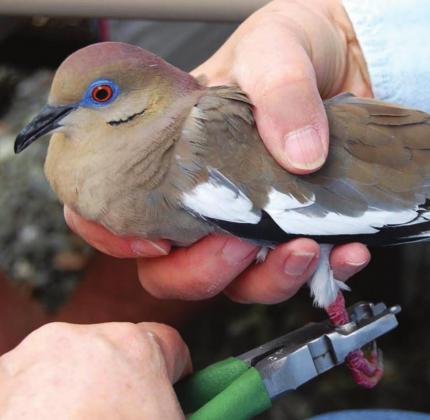Each summer, Texas Parks and Wildlife Department staff place leg bands on thousands of mourning and white-winged doves to monitor the factors that influence populations. Information from hunter-reported bands, or “recoveries,” provide estimates of harvest and survival rates, which are used with data from the Harvest Information Program, Parts Collection Survey and other harvest surveys to help manage populations and set annual hunting regulations.
The Harvest Information Program (HIP) is a national program that estimates migratory game bird harvest and hunting activity by asking hunters a series of questions about their experience the previous season. The Parts Collection Program uses wings from harvested birds to determine species, sex and age composition, while other harvest surveys are sent out to help fine-tune harvest estimates across the state.
“Doves are the most popular game bird in the country, and Texas leads the nation in overall harvest and hunter numbers, so it’s critical that we understand how harvest affects dove populations,” notes Owen Fitzsimmons, TPWD’s Webless Migratory Game Bird Program leader. “Much of the information we use to manage these species comes from hunters, so I urge all hunters to report any bands they find and be as responsive and accurate as they can when responding to any harvest surveys or HIP questions during their license purchasing process.”
Texas hunters can look forward to the following dove season dates:
• North Zone: Sept. 1-Nov. 12, Dec. 18, 2020-Jan. 3, 2021;
• Central Zone: Sept. 1-Nov. 1, Dec. 18, 2020-Jan. 14, 2021;
• South Zone: Sept. 14- Nov. 1, Dec. 18, 2020- Jan. 23, 2021.
• Special White-winged Dove Days: Sept. 5, 6, 12, 13 (shooting hours are from noon to sunset)
For the third year in a row, the South Zone regular dove season will open Sept. 14. Prior to 2018, federal frameworks allowed the South Zone regular season to open on the Friday closest to Sept. 20, but on a date no earlier than Sept. 17.
TPWD worked with the U.S. Fish & Wildlife Service to adjust federal regulations to allow the earliest opening date in decades, Sept. 14, to open up more of early September for South Zone hunters. This comes after other recent federal changes including the expansion of the special white-winged dove area to include the entire South Zone in 2017 and lengthening of the season from 70 days to 90 in 2016.
“The opening day change actually started a couple of years back, but Sept. 14 falls on a Monday this year, so people are starting to notice,” said Fitzsimmons. “These recent changes are huge for our hunters. By fixing the opener on the 14th every year and using our four Special White-winged Days, South Zone hunters now have guaranteed hunting opportunity every weekend in September and, depending how the calendar falls, start a week or so earlier than they ever have in the past. It’s not the Friday opener most are accustomed to, but given that over 80% of dove harvest occurs the first few weeks of the season, it’s important to us to try and give South Zone hunters as much opportunity in September as possible.”


